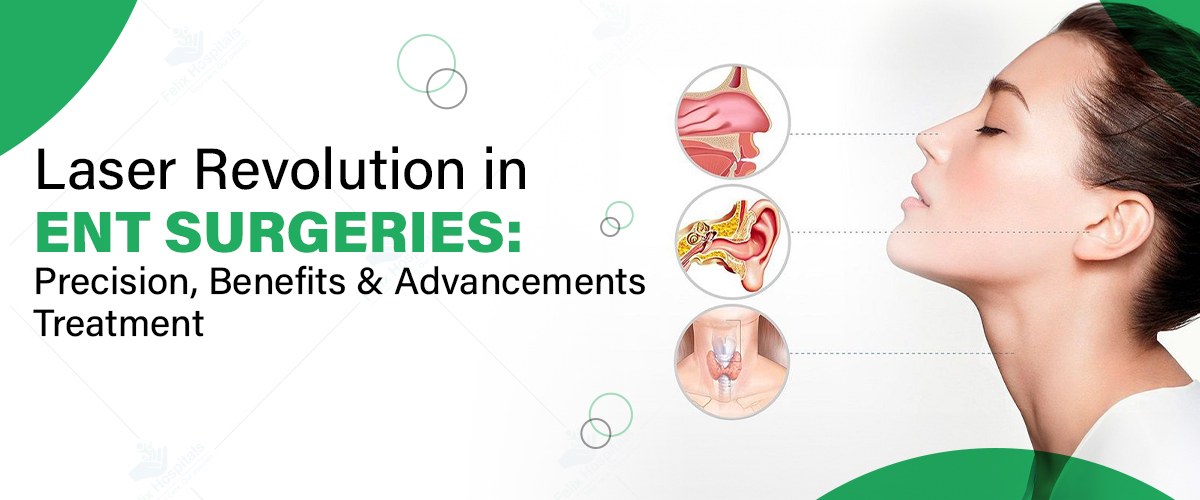
Subscribe to our

In the realm of modern medical advancements, laser technology has revolutionized ENT (Ear, Nose, and Throat) surgeries, offering precision, faster recovery, and less invasive procedures. For those suffering from airway obstructions, finding the best hospital for airway obstruction treatment is critical. Laser technology provides a breakthrough in treating various ENT disorders with unparalleled accuracy, minimizing risks, and ensuring effective outcomes. At the Hospital, you need specialists to leverage cutting-edge laser techniques to offer patients enhanced care and swift recovery.
Get in touch with Felix Hospital today to consult with our Top ENT Specialists by calling +91 9667064100.
The laser revolution in ENT surgeries refers to the integration of laser technology in treating ENT conditions. Unlike traditional methods, laser surgeries use concentrated beams of light to cut, vaporize, or remove abnormal tissue with precision. These techniques are especially effective in treating airway obstructions, chronic sinusitis, tonsillectomies, ear disorders, and even certain throat cancers. Laser technology offers a minimally invasive alternative, reducing recovery time and enhancing precision.
Several conditions make laser-assisted ENT Surgery the preferred treatment choice:
1. Airway Obstructions: Conditions like sleep apnea, nasal polyps, or vocal cord lesions can block the airway, requiring precise intervention.
2. Chronic Sinusitis: Infections that don’t respond to medication can be treated with laser surgery.
3. Tonsillitis: Recurrent infections often call for tonsillectomy, where lasers are used for precision removal.
4. Ear Disorders: Problems such as otosclerosis (hardening of the ear bones) can be managed using laser techniques.
Laser technology allows for extremely precise incisions and removal of tissues, minimizing damage to surrounding healthy tissues. This precision is vital in areas such as the vocal cords, where traditional surgery can lead to voice complications. With lasers, surgeons can perform delicate operations with high control, resulting in quicker recovery, reduced bleeding, and less postoperative pain.
1. Minimally Invasive: Laser surgery requires smaller incisions, translating to less tissue trauma.
2. Reduced Bleeding: Lasers cauterize blood vessels as they cut, reducing the need for sutures and minimizing blood loss.
3. Faster Recovery: Patients experience shorter recovery times due to the procedure's precision and minimally invasive nature.
4. Decreased Risk of Infection: Smaller wounds and less tissue damage lower the risk of postoperative infections.
5. Shorter Hospital Stays: Patients can often return home the same day or after a short hospital stay.
Diagnosis for ENT disorders typically begins with a comprehensive clinical examination, followed by imaging tests such as CT scans, MRIs, or endoscopic evaluations. For conditions like airway obstructions or sinus issues, these diagnostic tools help ENT specialists evaluate the severity and determine whether laser surgery is appropriate.
Once diagnosed, treatment plans are developed based on the patient's condition. ENT surgeries utilizing laser technology are precise and cater to the patient's specific needs. For example, treating nasal polyps or enlarged tonsils with lasers leads to more effective results than traditional methods. When considering ENT surgery, ENT surgery cost for laser revolution is competitive, with Felix Hospital offering affordable packages without compromising quality care.
At Felix Hospital, we take pride in having some of the best doctors for laser revolution in ENT surgery. Dr. Arvinder Pal Singh and Dr. Kunwar Parvez are highly skilled ENT specialists, renowned for their expertise in laser-assisted surgeries. They bring years of experience and are committed to delivering the highest level of patient care using the latest in medical technology.
Book your consultation with the best doctors at Felix Hospital today and discover the benefits of laser revolution in ENT treatments by Clicking Here.
The laser revolution in ENT Surgeries has dramatically improved treatment outcomes, offering patients a minimally invasive, precise, and effective solution for various ENT disorders. Whether you are suffering from chronic sinusitis, airway obstructions, or ear disorders, laser-assisted surgery offers numerous benefits, including faster recovery, reduced bleeding, and decreased risk of complications. Felix Hospital, with its state-of-the-art facilities and expert ENT specialists, ensures that you receive top-quality care tailored to your needs.
1. What conditions can be treated with laser-assisted ENT surgery?
Laser-assisted ENT surgery can treat a wide range of conditions, including chronic sinusitis, tonsillitis, nasal polyps, airway obstructions, and vocal cord lesions.
2. Is laser ENT surgery painful?
Due to its minimally invasive nature, laser ENT surgery results in less postoperative pain compared to traditional surgery. Recovery is generally faster and more comfortable for patients.
3. How long does recovery take after laser ENT surgery?
Recovery times vary depending on the procedure, but most patients experience quicker recovery with laser surgery, often returning to normal activities within a week or two.
4. What is the cost of ENT surgery with laser technology?
The cost of laser-assisted ENT surgery can vary depending on the specific condition and procedure. At Felix Hospital, we offer competitive pricing and comprehensive care.
5. Are there any risks or side effects associated with laser ENT surgery?
While laser ENT surgery is generally safe, as with any surgical procedure, there are potential risks. These may include temporary swelling, minor bleeding, or infection. However, laser surgery significantly reduces the likelihood of complications compared to traditional methods.
6. How do I know if I’m a candidate for laser-assisted ENT surgery?
Your ENT specialist will evaluate your condition through a physical exam and necessary diagnostic tests. Conditions like airway obstructions, nasal polyps, and vocal cord issues may be suitable for laser surgery, but the final decision will depend on your specific diagnosis and overall health.
7. What should I expect during the recovery period after laser ENT surgery?
Post-surgery, most patients experience mild discomfort and swelling, which subsides in a few days. Your specialist will provide post-operative care instructions, and patients can usually return to daily activities much sooner than with traditional surgeries.